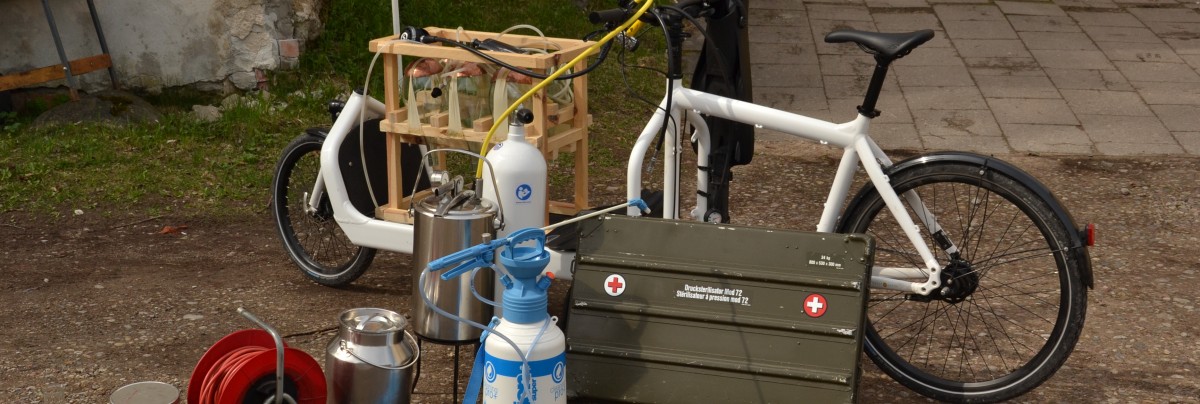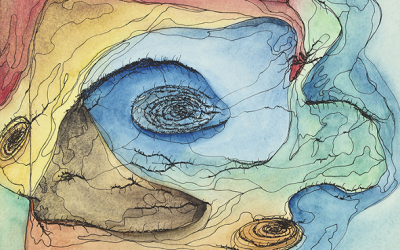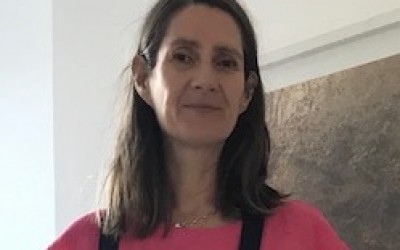The Research Base for Artistic Biotechnologies (REBARBIO, working title) is being completed in the basement of the VDA's Central Palace. It brings together various research equipment that normally belong to other fields of science and practice outside art and design: biotechnology, logistics, energy production, diving, etc. In this case, these technologies will be used to research a wide range of biological and social phenomena, but with the methods of art and design practices. The base is part of the VDA project "Creative interdisciplinary New European Bauhaus (NEB)-research centre".
Guided tours in English will be led by researcher Jan Georg Glöckner. You will be introduced to the base, its main facilities and the research plan as well as to opportunities it offers to the VDA community.
The tours will take place on Tuesday 16 April, followed by an informal discussion and networking at 17.00 and a tasting of the products developed at the base.
The tours will take place at 16.00 and 16.30. Please register here, as due to technological constraints, only 15 people per tour are allowed. Meeting place is VDA bookshop (Maironio st. 6). https://forms.gle/3G62KchMEnSuTsSn9
Although at first glance this space may resemble a bio-lab, this is not the case only because it is located in the VDA, the University of the Arts. On the other hand, part of the research base will function as a biolab, but with a different purpose than you might think. Come and have a look around.
REBARBIO is per default anti-colonial and skeptical of power relations within laboratory settings. This reflects in the methods deployed in REBARBIO:
- All research will be carried out in situ and in vivo.
- The micro-invasive methods that we come to cherish in procedures carried out on human bodies are
- extended towards microbial bodies.
- The uttermost care is taken to reduce damage to the research subjects and their habitats.
- The precautionary principle is guiding in all research decisions.
This research base, led by researcher Jan Georg Glöckner, will later be used by other researchers trained and prepared to work with biological materials and, from 2024/2025, by students on appropriate courses. The site will also become a platform for field research expeditions, with small teams of researchers (literally) driving out from the site to carry out research in Lithuanian lakes and other areas. Mobility, sustainability, solar and human energy, and research ethics will be important operating principles of this base.
REBARBIO wants to raise awareness and start the discussions of who is doing research on whom, whose natural rights are more important than others, and in which cases the benefit for humanity stands above the rights of other-than-humans, and in which cases it doesn’t. REBARBIO work has no moralist intentions. Everyone researching living bodies must be aware that ethically unsolvable situations will continue to appear, and navigating them is a part of it. REBARBIO is expected to put the VDA on the global map of innovative art academies, as we will be using new transdisciplinary technologies and methods and working in new areas of research, such as biological art and choreographic design.
REBARBIO is part of a larger team of researchers who carry out fundamental scientific and artistic research. Since December 2023, a new transdisciplinary team of researchers has been working at the VDA to evaluate the phenomenon of artistic research that has flourished in recent decades from the perspective of a variety of different scientific, artistic and design practices. The research team is working on a new VDA project entitled "Creative Interdisciplinary New European Bauhaus (NEB)-Research Centre", funded by the University Excellence Initiative.
The thematic working group is composed of leading international researchers: senior researchers Dr. Aldis Gedutis, Dr. Kęstas Kirtiklis, Dr. Mika Elo (Finland) and junior researcher Jan Georg Glöckner (Germany/Lithuania). The research team is led by Dr Vytautas Michelkevičius.
These researchers have formed a transdisciplinary team and will draw on methodologies from philosophy, sociology, art history, communication sciences and art and design practices to carry out fundamental research over a period of four years, with the plan to publish the findings in a collective monograph with an international publisher in 2027.
Read more about the ""Creative Interdisciplinary New European Bauhaus (NEB)-Research Centre", and the other researchers working there, here https://www.vda.lt/lt/naujienos/programos-universitetu-ekscelencijos-iniciatyva-metu-vilniaus-dailes-akademijoje-bus-kuriamas-tarpdisciplininis-naujojo-europos-bauhauzo-meno-tyrimu-centras
We would like to thank Inga Valentinienė, Irena Turčinavičienė, Rita Ženčienė, Virgilijus Kireilis, Linas Nedzinskas and the whole team of the Economy Division for helping to set up the research facility.







